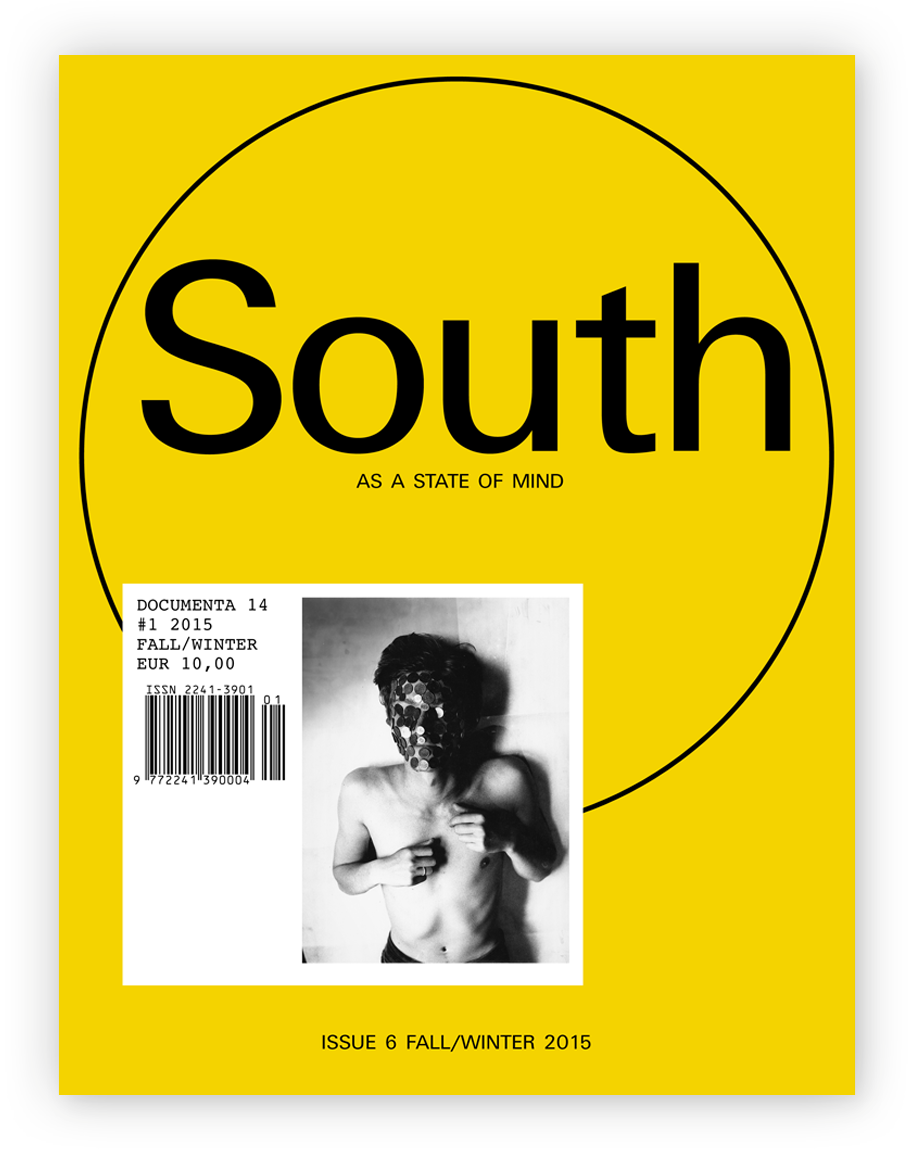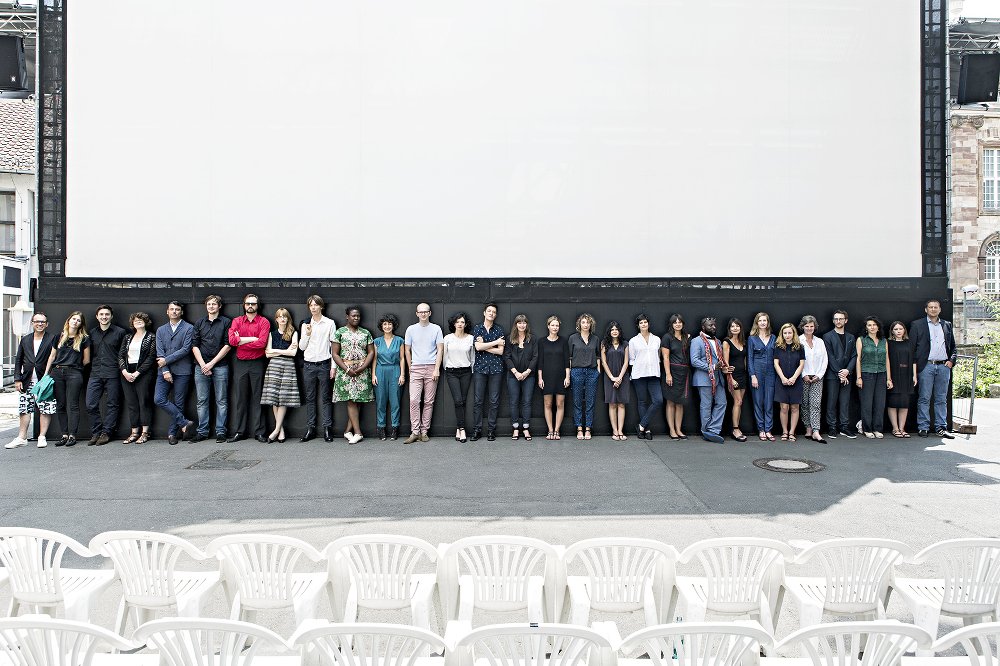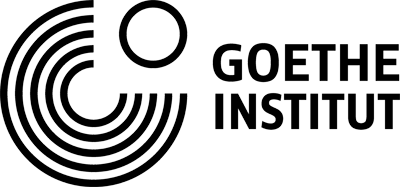Launch of the documenta 14 publication program with
South as a State of Mind #6 [documenta 14 #1]
We often imagine our place in the world—or others imagine it for us—via loaded directionals like North and South, East and West. Or it might be said that one's movement in these directions is paramount. What does it mean, then, in 2015 for documenta—a German institution firmly rooted in the global North, begun, as it was, as an exhibition dedicated to “Western European art” in 1955 in the city of Kassel, which once looked toward West Germany’s Eastern frontier– to publish a magazine called South? Further, what does it mean for documenta 14 to be hosted by an already-existing Athens magazine called South as a State of Mind? These are some of the questions we have asked ourselves as we spent the past several months editing the first documenta volume of South in Athens. In its new, temporary role as the magazine of documenta 14, South arrives late this October, a year and a half before the exhibition is scheduled to open, first on April 8, 2017, and then in Kassel two months later, on June 10.
In keeping with the concept of documenta 14 as a bi-located exhibition—one in which the exclusive role of host is left behind for a more radically receptive position—and in working with existing institutions and initiatives, we are hosted in the pages of South as a State of Mind by Marina Fokidis, who founded the magazine in Athens in 2012. For the four documenta 14 editions of the journal, which will be published semiannually until the opening of the exhibition in 2017, we are guests only. We imagine the South of documenta 14—both the journal and the imagined spaces it invokes—as a place of research, critique, art, and literature paralleling the years of work on the exhibition overall, one that will help define and frame its concerns and aims. Writing and publishing, in all their forms, will be an integral part of documenta 14, and we believe that this magazine will herald that process.
South d14’s first issue was produced during a period marked by a dramatic worsening of the economic and humanitarian crisis in Greece. The establishment and dissolution and reinstatement of the left-wing government, under conditions created by European-imposed austerity programs, was accompanied by the near-collapse of the Greek banking sector. The refugee crisis, meanwhile, has been escalating, with the displacement of millions of Syrians fleeing civil war, as well as those escaping the violence and repression in Iraq, Afghanistan, and sub-Saharan Africa. As has been noted widely, this is the largest global displacement of people since World War II, and for many of the refugees entering Europe, Greece is their first stop. In this state of emergency, the magazine, through the voices of its diverse authors—among them artists, poets, scholars, architects, and filmmakers—takes form as a manifestation of documenta 14 rather than as a discursive lens through which to merely presage the topics to be addressed in the eventual exhibition.
“In the current process of decolonization, memories of itineraries of the enslaved, migrants, and refugees are reactivated against new politics of forgetfulness,” notes Françoise Vergès in the pages of our first issue. “Memory here is not the realm of subjective fleeting thought but a source of images, texts, and songs that constitute a counterhegemonic library for present battles.” It is that counterhegemonic library for present battles—filled with essays, images, stories, speeches, diaries, and poems—that we have tried to assemble here, and that we see as our guiding vision not only for the next three volumes of South as a State of Mind, but for the documenta 14 publication program as a whole. If this first volume examines forms and figures of displacement and dispossession, and the modes of resistance—aesthetic, political, literary, biological—found within them, coming issues will continue our exploration of coloniality and neoclassicism, performativity and the poor copy, silence and masks, feminism and transfeminism, hunger and architecture, and the politics of misery and its representations, from misericordia to miserliness. Through its journal, documenta 14 has already set off on its journey, amid dramatic events and developments affecting entire nations and continents, destination as yet unknown.
In addition to South as a State of Mind’s print publication, redesigned for documenta 14 by Mevis & van Deursen, Amsterdam, there will be an online edition of the journal that makes content available in three languages: German, Greek, and English. The online edition will be launched October 31, to coincide with the publication of the first print edition of documenta 14 South. You will find it here: documenta14.de/south
To launch the first issue of the documenta 14 South as a State of Mind, five related events will be held in Athens, Kassel, Berlin, Dhaka, and Kolkata over the next several months, conceptualized by Adam Szymczyk, documenta 14’s Artistic Director; Quinn Latimer, Editor-in-Chief of Publications; and Paul B. Preciado, Curator of Public Programs. More detailed information about these events will be available on documenta 14’s website soon.
With contributions by Alexander Alberro, Katerina Anghelaki-Rooke, Aristide Antonas, Hannah Arendt, Pierre Bal-Blanc, Miriam Cahn, Manthia Diawara, Angela Dimitrakaki, Maria Eichhorn, Fouad Elkoury, Marina Fokidis, Peter Friedl, Hans Haacke, Bhanu Kapil, Quinn Latimer, Yorgos Makris, Jonas Mekas, Marta Minujín, Naeem Mohaiemen, Bonaventure Soh Bejeng Ndikung, Linda Nochlin, Paul B. Preciado, Thomas Sankara, Brandon Shimoda, Sven Stilinović, Adam Szymczyk, Françoise Vergès, Kaelen Wilson-Goldie, and Stefan Zweig
South as a State of Mind #6 [documenta 14 #1]
Edited by Quinn Latimer and Adam Szymczyk
230 x 300 mm, 262 pp., num. col. and b/w illustrations, English
Euro 10,-
Published October 31, 2015
ISSN 2241-3901
ISBN 978-3-86335-844-0
Designed by Mevis & van Deursen, Amsterdam
Printed in Greece
Design South Online: Laurenz Brunner, Julia Born, Julia Novitch
Realization: Systemantics
New members join the documenta 14 team
documenta 14 is organized by Artistic Director Adam Szymczyk together with a team whose first members were announced in October 2014. This team has been now joined by new members, among them:
Paul B. Preciado as Curator of Public Programs, Sepake Angiama as Head of Education, Clare Butcher as Education Coordinator, Arnisa Zeqo as Education Coordinator, Bonaventure Soh Bejeng Ndikung as Curator at Large, Natasha Ginwala as Curatorial Advisor, Candice Hopkins as Curatorial Advisor, and Jill Winder as Online Editor.
Biographies
Paul B. Preciado is a philosopher, curator, and transgender activist, and one of the leading thinkers in the field of gender and sexual politics. An Honors Graduate and Fulbright Fellow, he earned an M.A. in Philosophy and Gender Theory at the New School for Social Research in New York, where he studied with Agnes Heller and Jacques Derrida. He holds a PhD in Philosophy and Theory of Architecture from Princeton University. His first book, Contra-Sexual Manifesto (forthcoming publication by Columbia University Press in 2015) was acclaimed by French critics as “the red book of queer theory” and became a key reference for European queer and transgender activism. He is the author of Testo Junkie. Sex, Drugs and Biopolitics (The Feminist Press), and Pornotopia (Zone Books), for which he was awarded the Sade Price in France. He has served as Head of Research at the Museum of Contemporary Art of Barcelona (MACBA) and Director of the Independent Studies Program (PEI). He teaches Philosophy of the Body and Transfeminist Theory at Université Paris VIII-Saint Denis and at New York University.
Sepake Angiama is an educator and curator whose interest revolves around critical, discursive education practices and the “social framework.” Previously, Sepake served as Director of Education for Manifesta 10, Saint Petersburg, Russia, Curator of Public Programmes at Turner Contemporary, Margate, England, and Public Programmes Coordinator at the Hayward Gallery, London. She has devised education programs for a number of leading international institutions, including Tate Modern, Hayward Gallery, London, and Frieze. Her curatorial and education projects include film commissions of British artist John Smith, Horizon (Five Pounds a Belgian, 2012), What can we achieve together? (2009-2012); Centre for Cooperative Living (2010) and What can you achieve by getting to know your neighbour?, a collaborative publishing project [...] at the PUBLIC SCHOOL in Brussels (2010); The Tourist (2009), an exhibition and project with Åbäke; the collaborative project Office of Real Time Activity (2009); and Drawn to Dance (2005) at the Hayward Gallery, London.
Sepake earned her M.A. in Contemporary Art Curating at the Royal College of Art, London, where she received the Monique Beudert Award for her exhibition project.
Clare Butcher is a teacher and curator from Zimbabwe, who cooks as part of her practice. She arranges reading, writing, and research sessions with students at the Gerrit Rietveld Academy and the Piet Zwart Institute’s Masters of Education in Art & Design program. Her own education includes an MFA from the School of Missing Studies in 2015, a Masters in Curating the Archive from the University of Cape Town in 2012, and participation in the de Appel Curatorial Programme in 2008/09. Other collaborative and individual endeavors include a position as guest curator with the Van Abbemuseum, where she served as co-curator of the Autonomy Project (2010��–12); Men Are Easier to Manage Than Rivers (2015); Historical Materialisms (2014–); Every Great Undertaking Has Its Ups And Downs (2014); Scenographies (2013); The Principles of Packing… on two travelling exhibitions (2012); and If A Tree… on the Second Johannesburg Biennale (2012).
Arnisa Zeqo is an art historian. After an initial involvement with poetry and literature, she studied Art History and Philosophy at the University of Amsterdam, focusing on the work of Marcel Duchamp. In her first teaching position, she taught ethics at the University of Maastricht. In 2011 she co-founded rongwrong, a space devoted to art and theory in Amsterdam, which aspires to bring together artistic practices and reflective discourse on an intimate platform. At rongwrong, a series of exhibitions was complemented by tea parties, gossip sessions, marathone readings, activist proclamations, and poetry discussions. In her curatorial educational work she has collaborated with institutions such as the Piet Zwart Insitute Master of Fine of Arts (2013), Werkplaats Tipografie (2014), and the Stedelijk Museum (2014). In 2015 she was Curator in Residence at Center for Curatorial Studies at Bard College, where she wrote the conceptual essay “Lets spit on Szeemann.”
Bonaventure Soh Bejeng Ndikung, PhD is an independent curator and biotechnologist. He is the founding director of SAVVY Contemporary, Berlin and Editor-in-Chief of SAVVY, a journal for critical texts. Recent curatorial projects include If You Are So Smart, Why Ain't You Rich? On the Economy of Knowledge, Marrakesh, 2014 (P. Doutreluingne); Giving Contours to Shadows, Neuer Berliner Kunstverein, Gorki Theater, Gemäldegalerie, SAVVY Contemporary as well as satellites in Dakar, Johannesburg, and Nairobi, 2014 (E. Agudio, S.J.v. Rensburg); but the sea kept turning blank pages looking for history – on the state of refugeeness, SAVVY Contemporary, 2014; the discursive program – Wir Sind Alle Berliner: 1884-2014, ICI Berlin, 2015 (S. Kobschall, A. Jäger, S. Njami); Satch Hoyt: Riding Celestial Vessels, Galerie Wedding, 2015; and Emeka Ogboh: No Food for Lazy Man, Galerie Wedding, 2015. He is co-curator with S. Ovesen of An Age of our Own Making for Images Biennale 2016 in Holbæk, Roskilde, and Copenhagen. Upcoming projects for 2016 incl. The Incantation of the Disquieting Muse - On Divinity, Parallel- and Supra-realities or the Exorcisement of 'Witchery' and The Conundrum of the Imagination - on the paradigm of exploration and discovery.
Selected lectureships at Fondation Gulbenkian Paris, 2013; Tyler School of Art Philadelphia, 2014; Haverford College, 2014; Deutsche Bank Kunsthalle, 2014; CuMMA Discourse Series, Aalto University Helsinki, 2015. As adjunct professor, he lectured on Post-/decolonial Theory and Art to the class of Prof. Antje Majewski at the Muthesius Kunsthochschule Kiel.
Natasha Ginwala is a curator, researcher, and writer. She is curator for the 8th edition of CONTOUR Biennale (2017). Recent projects include My East is Your West featuring Shilpa Gupta and Rashid Rana at the 56th Venice Biennale; Mind Moves Matter at L' appartment 22, Rabat; Corruption...Everybody Knows with e-flux journal, SUPERCOMMUNITY issue. She was a member of the artistic team for the 8th Berlin Biennale for Contemporary Art (with Juan A. Gaitán) and curated The Museum of Rhythm at Taipei Biennial 2012 (with Anselm Franke). From 2013–15 she led the multi-part curatorial project Landings presented at the Witte de With Center for Contemporary Art, David Roberts Art Foundation, NGBK (as part of the Tagore, Pedagogy, and Contemporary Visual Cultures Network), the Stedelijk Museum Amsterdam, and other partner organizations (with Vivian Ziherl). Ginwala trained in Visual Studies at the School of Arts and Aesthetics, JNU in New Delhi and participated in the de Appel Curatorial Programme, Amsterdam (2010-11). She has written on contemporary art and culture and has contributed to numerous publications.
Candice Hopkins is Chief Curator at The IAIA Museum of Contemporary Native Arts in Santa Fe, New Mexico. She has held curatorial positions at the National Gallery of Canada, the Western Front, and the Walter Phillips Gallery. Hopkins's writings on history, art, and vernacular architecture have been published by MIT Press, BlackDog Publishing, Revolver, New York University, Fillip Review, and the National Museum of the American Indian, among others. She has lectured widely, including a keynote presentation with Hetti Perkins on the “sovereign imagination” for dOCUMENTA (13). She is co-curator of the exhibitions Close Encounters: The Next 500 Years; Sakahàn: International Indigenous Art; and the 2014 SITE Santa Fe Biennial exhibition Unsettled Landscapes. Hopkins has co-edited the books Recipes for an Encounter (Western Front) and Jimmie Durham: The Second Particle Wave Theory (Walter Phillips Gallery Editions and Art Editions North).
Jill Winder is a writer and editor who studied political theory and holds an M.A. from the Center for Curatorial Studies, Bard College, New York. From 2007 to 2011 she was Curator of Publications at BAK, basis voor actuele kunst, Utrecht, where she served as co-founding editor of BAK’s Critical Reader series and on the research team of the FORMER WEST project. Winder has been awarded research and writing fellowships from the Institute of Current World Affairs and the Thomas J. Watson Foundation, and has edited and co-edited numerous artists’ monographs and critical readers. She was also managing editor for the publications of the 7th and 8th Berlin Biennales (2012/2014). Most recently, Winder worked as Head of Research and Publications for Bergen Assembly (2012–13) and Editor-in-Chief of art-agenda (2012–14). She is based in Berlin.
|




